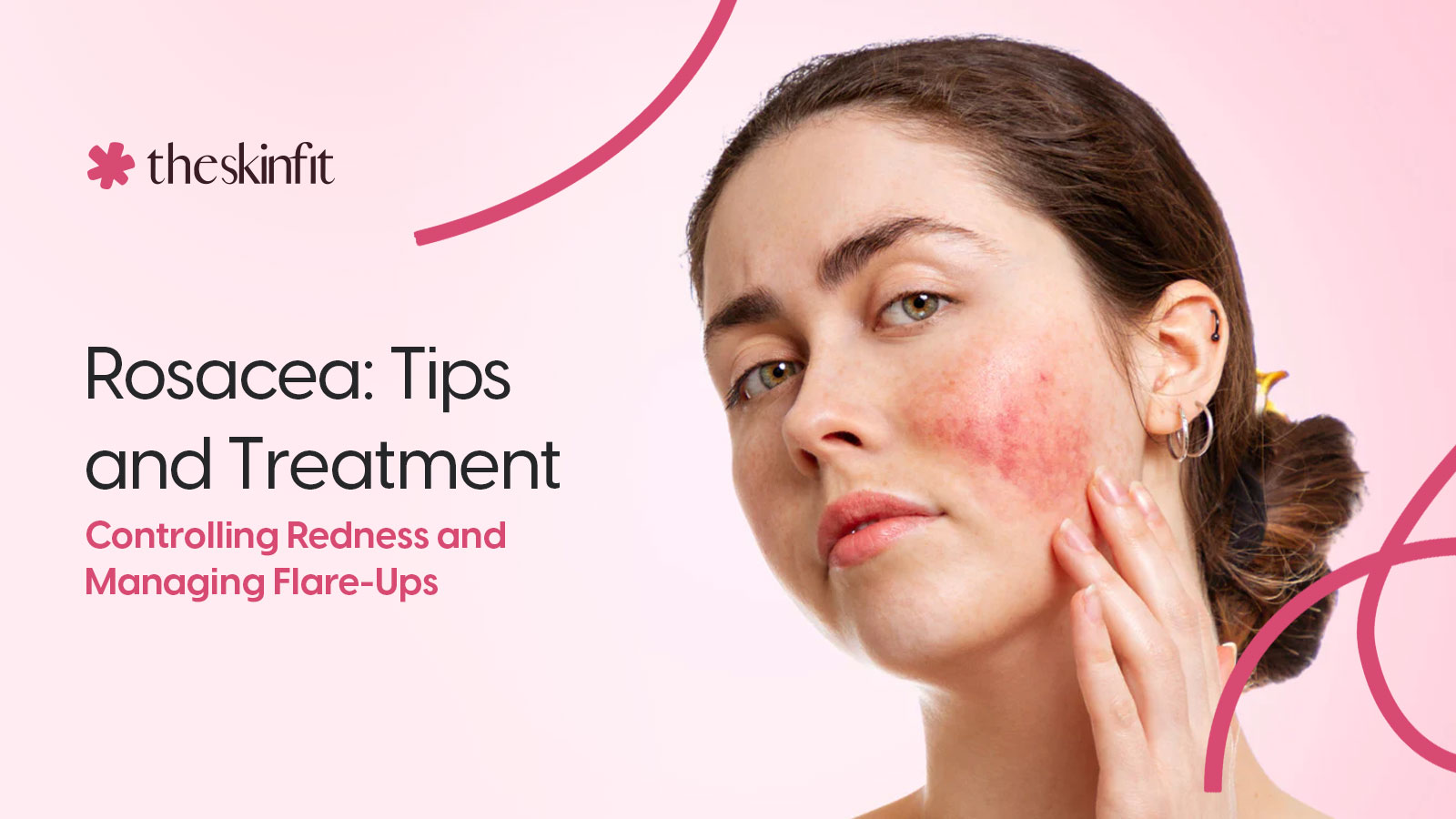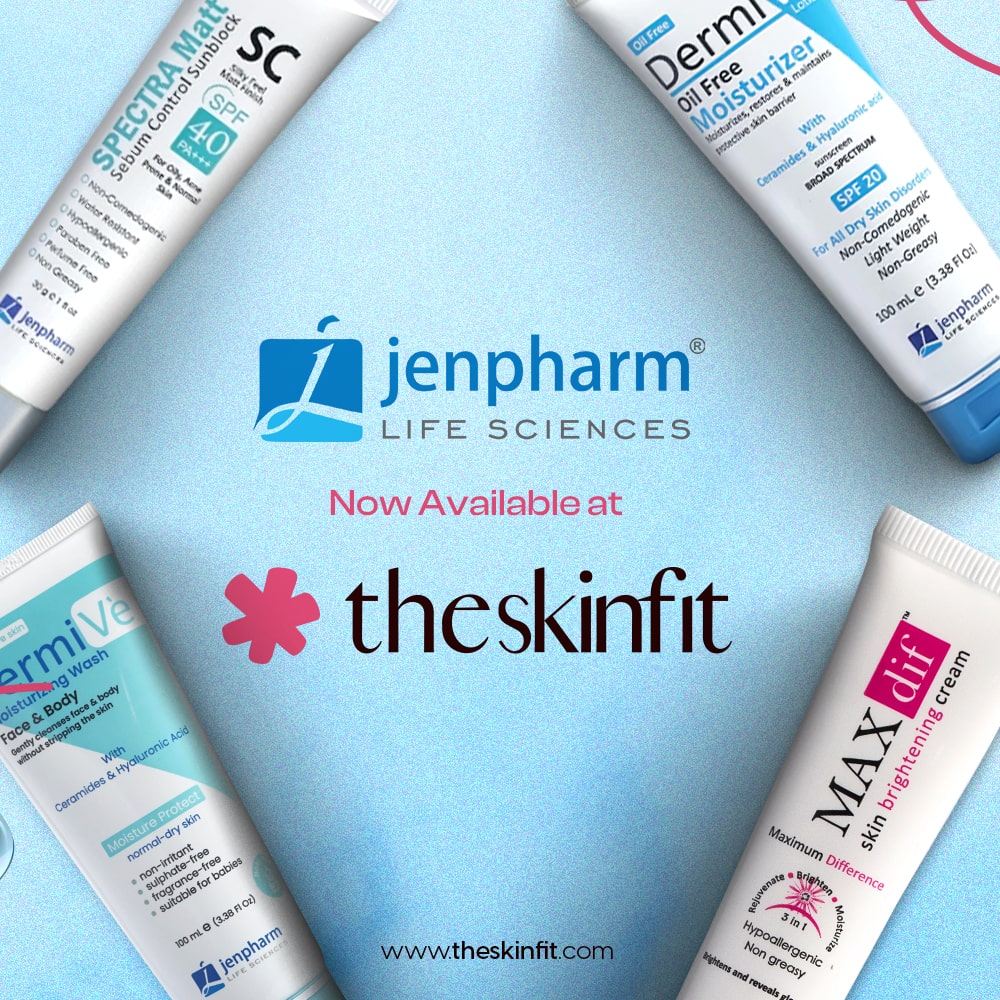If this is the case, you may have rosacea, a chronic skin disease affecting millions worldwide. But don't worry! We're digging into the world of rosacea in this blog, equipped with helpful hints, effective treatments, and professional guidance to help you take charge and handle those flare-ups like a pro.
Say goodbye to the aggravation and shame rosacea causes, and hello to healthier, calmer skin!
Rosacea is a chronic skin condition that causes facial flushing, redness, and the appearance of tiny, visible blood vessels. It may also lead to acne and thicker skin. While there is no known cure for rosacea, various strategies and treatments may help reduce redness, manage flare-ups, and relieve symptoms.
In this article, we will examine the causes of rosacea, discuss successful treatment options, and advise those suffering from this ailment.
What is Rosacea?
Rosacea is a skin condition that typically affects the center of the face, including the cheeks, nose, forehead, and chin. Although the precise etiology of rosacea is unclear, genetics, environmental triggers, and abnormalities in the blood vessels and immune system are thought to play a role in its development. Exposure to sunshine, hot temperatures, spicy meals, alcohol, stress, and specific skincare products are all major causes of flare-ups.
Rosacea symptoms include:
- Facial redness: Persistent redness in the center of the face.
- Flushing: Frequent or quick blushing.
- Visible blood vessels on the face are small, visible blood vessels.
- Pustules and papules: Acne-like outbreaks, sometimes known as "rosacea acne."
- Skin thickening: Skin may thicken, particularly around the nose.
- Eye problems: In certain situations, rosacea may affect the eyes, producing dryness, irritation, and redness (ocular rosacea).
What foods cause rosacea?
While triggers differ from person to person, some foods have been known to cause rosacea symptoms in some people. It is crucial to remember that not everyone with rosacea will experience the same dietary triggers, and the intensity of the effect may vary. Here are some common meals that have been linked to rosacea flare-ups:
- Spicy foods: Spicy meals, including chili peppers, cayenne pepper, or hot sauces, have been documented to produce flushing and aggravate redness in certain rosacea patients.
- Hot beverages: Drinking hot coffee, tea, or other hot drinks can make your face flush and get redder. It's best to let these beverages cool before drinking them.
- Alcohol: Many patients with rosacea report that alcohol, especially red wine, beer, and spirits, may cause flare-ups. Alcohol can widen blood vessels and enhance skin sensitivity, resulting in redness and flushing.
- Histamine-rich foods: Histamine is a naturally occurring component in many foods responsible for allergic reactions and inflammatory responses in the body. Histamine-rich foods, such as aged cheeses, fermented foods, pickled or cured meats, and some kinds of seafood, may cause rosacea symptoms in certain people.
- Citrus fruits: Citric acid, which is found in oranges, lemons, limes, and other citrus fruits, may produce flushing and irritation in those who are sensitive to it.
- Tomatoes: Due to their high acidity content, tomatoes, notably tomato-based items such as sauces and soups, have been found to cause rosacea symptoms in some individuals.
- Dairy goods: Some rosacea patients may suffer flare-ups after ingesting dairy products such as milk, cheese, and yogurt. This might be because of the lactose or proteins found in dairy.
- Chocolate: While the specific mechanism is unknown, chocolate has been noted as a trigger for certain rosacea patients. It could be due to the mix of sugar, caffeine, and other ingredients.
- Artificial additives and preservatives: Food additives such as monosodium glutamate (MSG), sulfites, and nitrites prevalent in processed foods might cause symptoms in certain people.
It's important to note that one's response to certain items might vary, and not all people with rosacea will be impacted by the same triggers. Keeping a food diary to document your diet and symptoms might help you determine your triggers and make educated dietary choices. If you feel that particular foods aggravate your rosacea symptoms, you should consult a dermatologist or a trained nutritionist for advice tailored to your unique requirements.
Tips for Rosacea Management
- Protect your skin: by using a broad-spectrum sunscreen with an SPF of at least 30, especially on days when the sky is overcast, to protect your skin from potentially damaging ultraviolet radiation.
- Gentle skincare regimen: Use soft, non-irritating cleansers and moisturizers designed exclusively for sensitive skin. Avoid strong scrubs, products containing alcohol, and perfumes.
- Avoid potential triggers: Determine and avoid the causes that aggravate your rosacea symptoms. Keep a notebook to keep track of what triggers flare-ups.
- Temperature control: Extreme temperatures may worsen rosacea. Protect your face from both cold and hot temperatures.
- Stress management: As stress may exacerbate flare-ups, try stress-relieving strategies like meditation, deep breathing, and yoga.
- Dietary changes: Limit or avoid spicy meals, hot drinks, alcohol, and foods that trigger flushing for you.
- Cosmetics: Choose non-comedogenic and fragrance-free cosmetics. Be wary of cosmetics that may irritate or clog your pores.
- Skincare items: Look for products that have elements that have been proven to be useful for rosacea-prone skin, such as green tea extract, niacinamide, or azelaic acid.
- Medical advice: See a dermatologist specializing in treating rosacea for a specific treatment plan. To successfully treat your symptoms, they may prescribe topical or oral drugs.
- Self-care: Engage in self-care activities that promote relaxation and general well-being. This might include hobbies, spending time with loved ones, and getting enough sleep.
- Test new products: Before using new cleansers, moisturizers, or cosmetics, test a patch on a tiny area of your skin to check for responses.
- See a dermatologist: Consult a doctor for advice on rosacea skincare. They may provide individualized guidance, offer items, and prescribe prescription or topical treatments.
- Rosacea management requires frequent moisturizing. Choose non-comedogenic, fragrance-free, sensitive skin moisturizers. To retain moisture, apply moisturizer on wet skin.
What are the best products for rosacea?
CeraVe SA Smoothing Cleanser
CeraVe SA Smoothing Cleanser is an exfoliating and smoothing cleanser manufactured with salicylic acid (SA). It aids in the unclogging of pores, the removal of dead skin cells, and the promotion of smoother skin texture. Ceramides and hyaluronic acid are also included to moisturize and rebuild the skin's protective barrier. This cleanser is appropriate for sensitive or acne-prone skin.
La Roche-Posay Toleriane Double Repair
La Roche-Posay Toleriane Double Repair is a moisturizer that hydrates while restoring the skin's natural protective barrier. It includes ceramides, niacinamide, and glycerin, which nourish and strengthen the skin. This moisturizer is ideal for sensitive skin and may help relieve rosacea-related dryness and redness.
The Ordinary Mineral UV Filters SPF 15
The Ordinary Mineral UV Filters SPF 15 is a broad-spectrum sunscreen with mineral filters such as zinc oxide and titanium dioxide. It protects the skin from UVA and UVB radiation, which may cause rosacea flare-ups. This sunscreen is appropriate for sensitive skin and can be worn regularly to protect against sun damage.
CeraVe Facial Moisturizing Lotion AM with Sunscreen SPF 30
CeraVe Facial Moisturizing Lotion AM is a lightweight SPF 30 broad-spectrum sunscreen. Ceramides, niacinamide, and hyaluronic acid moisturize and soothe the skin while offering UV protection. This moisturizer is ideal for everyday use and may aid in the prevention of sun-induced irritation and redness.
CeraVe Acne Foaming Cream Cleanser
CeraVe Acne Foaming Cream Cleanser is a mild cleanser for acne-prone skin. It includes benzoyl peroxide, a well-known acne-fighting agent, ceramides, and hyaluronic acid to help maintain the skin's moisture balance. This cleanser can be good for those with rosacea and acne outbreaks.
Conclusion
Although rosacea can be difficult to manage, a holistic approach that includes changing your lifestyle, avoiding triggers, and getting the right medical therapy can greatly enhance your quality of life and decrease the severity of your symptoms. Individuals with rosacea may acquire greater control over redness, manage flare-ups, and obtain healthier, calmer skin by following the advice given in this article. Remember that consistency and patience are vital in treating rosacea, and working closely with a dermatologist to build a tailored treatment plan that meets your unique requirements is essential.
So, what are you waiting for? Explore TheSkinFit Pakistan's leading online cosmetics and beauty store.


